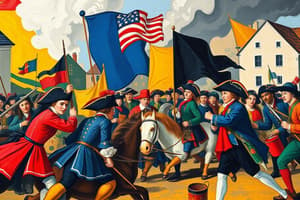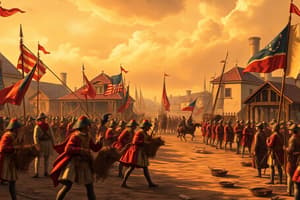Podcast
Questions and Answers
What was a significant disadvantage faced by the British during the American Revolution?
What was a significant disadvantage faced by the British during the American Revolution?
Which factor was crucial in securing a victory for the Colonists in the American Revolution?
Which factor was crucial in securing a victory for the Colonists in the American Revolution?
What was a limitation of the Articles of Confederation?
What was a limitation of the Articles of Confederation?
What was one reason for Colonial disunity during the American Revolution?
What was one reason for Colonial disunity during the American Revolution?
Signup and view all the answers
Which aspect of Washington's leadership contributed to the Colonial victory?
Which aspect of Washington's leadership contributed to the Colonial victory?
Signup and view all the answers
How did the British military condition affect their performance in the American Revolution?
How did the British military condition affect their performance in the American Revolution?
Signup and view all the answers
What was one consequence of the lack of an executive branch under the Articles of Confederation?
What was one consequence of the lack of an executive branch under the Articles of Confederation?
Signup and view all the answers
Which of the following was a colonial tactical advantage during the American Revolution?
Which of the following was a colonial tactical advantage during the American Revolution?
Signup and view all the answers
What was one of George Washington's significant failures during his presidency?
What was one of George Washington's significant failures during his presidency?
Signup and view all the answers
Which of the following was a key success of John Adams' presidency?
Which of the following was a key success of John Adams' presidency?
Signup and view all the answers
What major acquisition was achieved during Thomas Jefferson's presidency?
What major acquisition was achieved during Thomas Jefferson's presidency?
Signup and view all the answers
Which failure is associated with James Madison during his presidency?
Which failure is associated with James Madison during his presidency?
Signup and view all the answers
What was the primary focus of the Monroe Doctrine?
What was the primary focus of the Monroe Doctrine?
Signup and view all the answers
What was a significant internal conflict during Monroe's presidency?
What was a significant internal conflict during Monroe's presidency?
Signup and view all the answers
Which treaty did John Quincy Adams negotiate as Secretary of State?
Which treaty did John Quincy Adams negotiate as Secretary of State?
Signup and view all the answers
What was a notable failure of John Quincy Adams during his presidency?
What was a notable failure of John Quincy Adams during his presidency?
Signup and view all the answers
What was the main representation issue between smaller and larger states during the formation of government?
What was the main representation issue between smaller and larger states during the formation of government?
Signup and view all the answers
What was the purpose of the Three-Fifths Compromise?
What was the purpose of the Three-Fifths Compromise?
Signup and view all the answers
Which plan proposed a bicameral legislature based on population?
Which plan proposed a bicameral legislature based on population?
Signup and view all the answers
What did Jefferson fear would happen with a strong central government?
What did Jefferson fear would happen with a strong central government?
Signup and view all the answers
What compromise brokered by Madison led to a bicameral legislature?
What compromise brokered by Madison led to a bicameral legislature?
Signup and view all the answers
What was Hamilton's view regarding the financial system?
What was Hamilton's view regarding the financial system?
Signup and view all the answers
Which two countries did Hamilton and Jefferson support respectively in foreign policy?
Which two countries did Hamilton and Jefferson support respectively in foreign policy?
Signup and view all the answers
What interpretation of the Constitution favored the creation of the Bank of the United States?
What interpretation of the Constitution favored the creation of the Bank of the United States?
Signup and view all the answers
Study Notes
Colonial and British Advantages/Disadvantages in the American Revolution
-
Colonial Advantages:
- Home field advantage - motivation to defend their homes
- Guerilla tactics - attacking unexpectedly (night, winter)
- Rifle proficiency - accurate shots for hunting
- Support (2/3 of colonists)
- French alliance - financial and material support (loans, donations)
-
Colonial Disadvantages:
- Lack of professional army
- Insufficient funding
- Internal conflicts among colonists
-
British Advantages:
- Professional and large army, navy
- Superior military training
- Resources (money, technology, weapons)
- Support from Native Americans (1/3 colonists)
-
British Disadvantages:
- Distance and communication challenges
- Unfamiliar terrain
- Lack of public support (war unpopular)
Reasons for Colonial Victory
- British Overextension: Spread too thin globally, focusing on too many fronts.
- French Support: Crucial military and financial help, especially after Saratoga.
- Washington's Leadership: Kept the army together and secured many victories.
- British Exhaustion: Long, costly war, decreasing public support.
Articles of Confederation
- First US constitution, 1781
- Weak central government, loose confederation of states
- Limited powers to national government
- States retained sovereignty
- Congress could not tax, regulate interstate trade, or enforce laws uniformly
- Each state had one vote in Congress
- Required 9/13 states to pass laws
Reasons for Failure of the Articles of Confederation
- Weak central government
- Inability to tax or regulate trade effectively
Issues in Creating the Constitution
- Representation of states: Smaller states wanted equal representation; larger states representation based on population
- Slavery: How to count enslaved people for representation and taxation (3/5 Compromise)
- Separation of powers: Balancing strong central government with individual rights.
- State vs. Federal power: Balancing the authority between states and the national government
James Madison's Solutions
- Virginia Plan: Proposed bicameral legislature based on population
- New Jersey Plan: Proposed unicameral legislature with equal representation for states
- Great Compromise: Bicameral legislature; House (population-based) and Senate (equal)
- Three-Fifths Compromise: Enslaved people counted as 3/5 of a free person for representation and taxation
Hamilton vs. Jefferson
- Role of Government: Hamilton favored a strong central government, Jefferson supported states' rights.
- Economic Policy: Hamilton supported a national bank and a strong financial system, Jefferson favored an agrarian economy.
- Foreign Policy: Hamilton favored close ties with Britain, Jefferson supported France.
First Six US Presidents - Successes and Failures
-
Washington: Successes - Establishing precedents, navigating early economic issues. Failures - Struggles with political divisions, keeping neutrality in international relations.
-
Adams: Successes - Maintaining American neutrality in the face of European conflict. Failures - Alien and Sedition Acts, problems with France.
-
Jefferson: Successes - Louisiana Purchase. Failures - Embargo Act of 1807, difficulties maintaining consistent foreign policy.
-
Madison: Successes - Led the nation during the War of 1812. Failures - Costly war, unresolved issues with Britain.
-
Monroe: Successes - Monroe Doctrine. Failures - Internal divisions over slavery and westward expansion.
-
Quincy Adams: Successes - Negotiating key treaties, improvements; Failures - Opposition in Congress, facing bitter political opposition.
Studying That Suits You
Use AI to generate personalized quizzes and flashcards to suit your learning preferences.
Related Documents
Description
This quiz explores the advantages and disadvantages faced by both the colonies and British forces during the American Revolution. It covers key factors that contributed to the ultimate victory of the colonies, including military tactics, alliances, and logistical challenges. Test your knowledge of this pivotal period in history!




